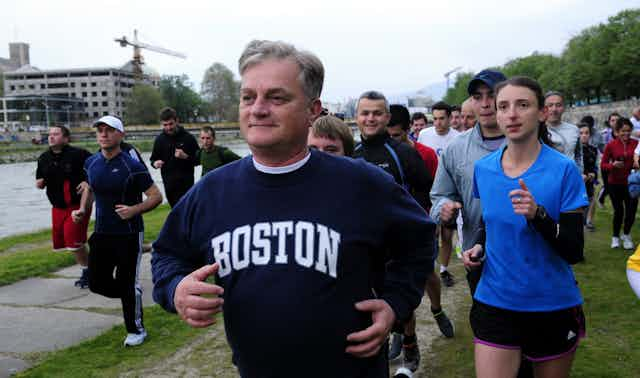Citizen sleuths were out in numbers (or holed up inside, frantically tweeting) after last week’s Boston Marathon bombings. Alongside the drip-drip from mainstream media and the trickle of information from official channels such as the FBI, a cascade of online speculation became a torrent, then a veritable deluge.
But did those many thousands of well-meaning people help or hinder the investigation? In other words, have we just seen citizen surveillance come of age?
“Citizen” has been used in a similar context for some time. The past decade has seen the phrase citizen journalism enter the language and assume a context we’re now familiar with: “ordinary” people record an incident of note and either post it electronically to a news organisation or circulate it though some form of social media.
The impact of this type of reporting came to the fore in 1991, when a member of the public videotaped Los Angeles police savagely beating Rodney King, an African-American they had been chasing.
The advent of mobile phones with cameras gave more impetus to citizen journalism, and the current crop of smartphones makes it simpler still.

When the Boston attacks happened it was no surprise ordinary citizens, who had been taking photographs on their smartphones both before and after the attack, wanted to assist – indeed, they were encouraged to do just that by the FBI.
And given its ubiquity, it’s also no surprise that social networking played a role in events as they unfolded.
The social news website Reddit became a major player and a subreddit called “findbostonbombers” reportedly had 870 subscribers and 1600 visitors within a day of the attack.
Users of the online bulletin board 4chan also tried to trace movements of various people in the crowd in an attempt to identify suspects, but failed.
In what’s been referred to as a crowdsourced investigation, users of the sites set themselves to scanning through video footage and photos taken at, and around, the time of the two explosions.
In this, they were doing much the same as the FBI and other law enforcement agencies would in this type of situation.

But the quality of the analysis was decidedly hit-and-miss – a heady mix of trolling, genuine analysis and well-meaning, but ultimately unhelpful amateurism.
The danger is that citizen sleuths make mistakes and draw inferences that aren’t there, and innocent people become tainted with suspicion. Which is exactly what happened.
Brown University student Sunil Tripathi, who has been missing since March, was one misidentified “suspect”.

This, and other, related incidents led the Los Angeles Times to comment that social media had spiralled out of control.
There are some important issues that need to be addressed in the aftermath of the Boston bombing and the massive manhunt that followed.
We must expect citizen sleuthing to become the norm in major events. People want to assist in the capture of perpetrators of serious crime and traditionally most police agencies request copies of any pictures that have been taken around the time and location of a major crime.
Their wish in the case of the Boston bombings was answered, but they probably did not expect the volume of information that was forthcoming.
Smile, you’re on camera
Cameras are already entwined with our lives and personal gadgets, and that relationship will only deepen as time goes on.
We are, many people would argue, already in a world of swarm intelligence.
People are doing their civic duty by on-the-spot sleuthing and armchair detectives will try to analyse images from the comfort of their homes; and they will oftentimes come to the wrong conclusion, as happened in Boston.

Police need to need to think about how to minimise the negative effects of this phenomenon while harnessing the benefits.
How do they deal with possibly hundreds of thousands of images either sent into police websites or posted onto social networking sites, and should it become a priority?
While neither the Boston police nor the FBI successfully used facial-recognition software to assist in identifying the suspects, computer-aided facial-recognition is coming of age and it can’t be long before it’s used to identify suspects in major investigations.
Beyond the witch hunt
For social media platforms and the people using them, the three days of the Boston incident were monumental, with all the intrigue and speculation of the greatest human dramas.

Tweets containing pictures of real-time incidents were circulated, giving those with an interest in the event anywhere in the world a front-row seat in an unfolding “terrorist” investigation and manhunt.
Boston is a great example of how compelling social networking can be, but it also illustrated its shortcomings.
Those shortcomings also spilled over into the media, with the New York Post printing photos of two innocent men, marked as potential suspects on Reddit, on their front page three days after the attack.
Reddit has since apologised for actions stemming from its “findbostonbombers” subreddit that
fuelled online witch hunts and dangerous speculation which spiralled into very negative consequences for innocent parties.
The Boston bombings have shown us a great deal of work needs to be done to harness the full potential of the citizen sleuth; and perhaps that this work is worth persevering with.

